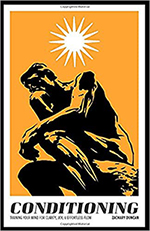Adaptability Practices
Important points that contemporary stress dialogs tend to overlook is that stress has different meanings for different people, different people respond differently to stressful situations, and that most people can learn to not only handle stress but to also tap stress as a functional force. Just as people interpret and respond to experience through an individual perspective, adaptability practices may ultimately be individual. But contemporary research offers functional practices individuals use to develop adaptability strategies that tap stress as a functional force for performance and wellness.
- Details
- Written by Brent A Duncan, PhD
Ranked as the #1 new book on Amazon, Zachary Duncan's "Conditioning: Training your mind for clarity, joy, and effortless flow" explores how to develop emotional maturity through no-nonsense spiritual growth.
- Details
- Written by Brent A Duncan, PhD
While researchers tend to focus on studying the few people who are harmed by an inability to handle stress, most people remain healthy even in high-stress environments. Understanding what makes most people resilient might help develop strategies for people who tend to be vulnerable to stress.
- Details
- Written by Brent A Duncan, PhD
Is stress something that happens to us or is stress the result of our interpretations and reactions to events?
Schwarzer and Taubert (2002) proposed a cognitive-transactional theory of stress that recognizes the reciprocal and continuous interaction between us and our environment. In this framework, stress is how we appraise and interpret environmental events that we perceive will tax our resources or threaten our well-being. The resulting proactive-coping framework can shift our perspective of events as stressors that make us sick to recognizing events as opportunities for growth. The event doesn't cause us stress, our inability to handle the event is what breaks us down. A proactive coping perspective helps us prepare for and leverage stressful events for adaptability, performance, growth, resilience, and wellness.
Let's explore the Schwarzer and Taubert cognitive-transactional theory to discover functional coping strategies for building resilience, mindset, and skills for facing and conquering stressful events as opportunities for growth.
- Details
- Written by Brent A Duncan, PhD
A primary reason individuals and social systems suffer harm from stress is that people do not just react to stressful events, they tend to turn stress into “an emotional and physiological habit,” according to Cryer and Childre (2003). While the stress mechanism in most animals tends to turn off after danger has passed, the choices, perceptions, and behaviors of humans can get the stress switch stuck in the “on” position.
- Details
- Written by Brent A Duncan, PhD
Even extreme stress can have positive side effects. Research and media reports focus heavily on post-traumatic stress disorder, providing the impression that PTSD is the rule; when the reality is that PTSD is the exception. Tedeschi and Calhoun (2004) point out that, "Only a minority of people who are exposed to traumatic events develop long-standing psychiatric disorders" (para. 1).
- Details
- Written by Brent A Duncan, PhD

Recommended reading: Harvard Business Review on Building Personal and Organizational Resilience





